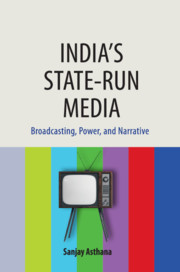Book contents
- Frontmatter
- Dedication
- Contents
- List of Figures and Tables
- Acknowledgements
- Introduction
- 1 Broadcasting, Spatiotemporalities, and Power
- 2 Doordarshan, Literary Drama, and Narrative Identity
- 3 Televisual Representations of Socio-Spatial Conflicts, and the Religious–Secular Imaginaries
- 4 Patriotism and Its Avatars: Tracking the National–Global Dialectic in Music Videos and Television Commercials
- 5 Remembering Doordarshan: Figurations of Memories and Nostalgia on Blogs, YouTube, and in Oral Interviews
- Epilogue
- Bibliography
- Index
1 - Broadcasting, Spatiotemporalities, and Power
Published online by Cambridge University Press: 08 May 2019
- Frontmatter
- Dedication
- Contents
- List of Figures and Tables
- Acknowledgements
- Introduction
- 1 Broadcasting, Spatiotemporalities, and Power
- 2 Doordarshan, Literary Drama, and Narrative Identity
- 3 Televisual Representations of Socio-Spatial Conflicts, and the Religious–Secular Imaginaries
- 4 Patriotism and Its Avatars: Tracking the National–Global Dialectic in Music Videos and Television Commercials
- 5 Remembering Doordarshan: Figurations of Memories and Nostalgia on Blogs, YouTube, and in Oral Interviews
- Epilogue
- Bibliography
- Index
Summary
In recent years, postcolonial media scholars have begun to focus their attention on the dialectic relations between state and media policies (McDowell, 1997; Chakravartty, 2004; Kumar, 2006; Jeffrey, 2006). While such scholarship has persuasively analysed the construction of nationalism and examined the debates surrounding autonomy and deregulation in Indian media policies in the context of economic liberalization, a significant absence from this body of work is an engagement with how the concept of sovereignty is being reworked in the moment of globalization. In addition, two issues manifest within communication research and postcolonial media studies that pertain to an understanding of the state as a container and a fixed entity, and the absence of adequate theorization of broadcasting and space. According to Raka Shome (2004: 40), ‘Communication research, for the most part, has yet to address in a systematic way the role space plays in the (re)production of social power.’ A few studies—collected in a book, MediaSpace—have taken up questions of space in terms of different media modalities: radio, television, computers, and video-gaming. Clive Barrett (2004) offers persuasive theoretical reflection on space and public life via the specific writings of John Dewey, Harold Innis, and Raymond Williams. Despite these contributions, broadcasting and space in the postcolonial contexts remains unexamined. More importantly, however, such studies have not produced a theoretical account of how broadcasting and media policies are connected with state spatialities as well as temporalities.
This chapter makes two interrelated claims. First, a ‘spatiotemporal’ discourse can be discerned in broadcasting and media policies that has framed nationalism, globalization, sovereignty, and citizenship, and India's nation state has historically elaborated two overlapping modalities of power: national sovereignty from 1947 to 1990, and governmentality since 1991. Second, taking a cue from Manu Goswami's (2004: 4) insights, I suggest that to understand the spatiotemporal discourses and the modalities of power, we need to move beyond ‘methodological’ nationalism: that is, explanations that treat the state as a container and a fixed entity, where social relations are organized within territorially bounded national spaces. Indeed, the spatiotemporal discourse of the state can be grasped through a transnational framework that considers national and international as part of the wider global field of relations.
- Type
- Chapter
- Information
- India's State-run MediaBroadcasting, Power, and Narrative, pp. 24 - 62Publisher: Cambridge University PressPrint publication year: 2019



